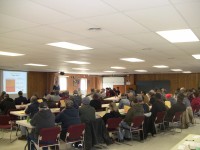Event Details
Date
April 9, 2015
Time
8:30 AM - 12 PM English Session & 12:30 PM - 4:30 PM Spanish Session
Location
Cornell Cooperative Extension Orleans Co.
12690 Rte. 31
Albion, NY 14411
Host
LOF and CVPKim Hazel
585-798-4265 x 26
email Kim Hazel
DEC Special Permit Training in Orleans Co.
April 9, 2015
DEC Special Permit Training Class for Non-Certified Applicators and Handlers of Federally Restricted-Use Pesticides
Orleans County, Thursday, April 9, 2015
Registration Begins at 8:00 am English & Spanish sessions
8:30 am to 12:00 pm
Orleans Co. Coop. Ext. Fairgrounds Trolley Bldg.
12690 Rte. 31 (between Albion and Medina)
Albion, NY 14411
Certified Supervisors are required to attend the first 30 minutes of training!
$20 per DEC Special Permit
DEC Special Permit allows non-certified workers to apply and handle federally restricted use pesticides. The Special Permit does not relieve the responsibility of the certified applicator that supervises these employees, but it does relieve the requirement of "on-site, within voice contact" supervision while federally restricted pesticides are being applied. Several of the pyrethroid, organophosphate, and carbamate insecticides such as Warrior, Capture, Diazinon, Lorsban and Lannate, and herbicides such as Gramoxone are federally restricted-use materials.
At Special Permit trainings, non-certified applicators review Worker Protection Safety (WPS) handler training. They also learn about the potential hazards to non-target species and the environment, for each federally restricted-use pesticide, in addition to the steps required on pesticide labels to prevent the risk of exposure to the applicators and non-target locations. Trainees receive a packet with summaries of this information.
A DEC Special Permit is valid for one year and needs to be renewed every year unless the pesticide applicator becomes certified. Please bring green “WPS Handler”cards.
Pre-Registration is Required by April 3, 2015 click here to register
We need information regarding farm name and address, name of the applicators' supervisor and their DEC pesticide license number, and names of applicators/handlers so that special permit forms may be prepared in advance. This greatly expedites registration and dismissal before and after trainings.To register: Complete registration form (download/attached) and mail check to:
Cornell Cooperative Extension, Attn: Kim Hazel, 12690 NYS Rt 31, Albion, NY 14411
Contact Kim Hazel: 585-798-4265 x26; krh5@cornell.edu
DEC Special Permit Training (PDF; 615KB)
DEC Special Permit Training Registration Form (PDF; 413KB)













































